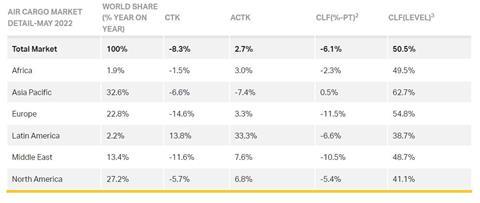The latest statistics from IATA show that air cargo demand declined again in May but the association is positive for the coming months as production in Asia continues to ramp up following Covid restrictions earlier in the year.
The IATA figures show that air cargo demand in cargo tonne-km (CTK) terms declined by 8.3% year on year in May, while load factors dropped by 6.1 percentage points on a year earlier to 50.5% and capacity was up 2.7%.
It is the third month in a row that demand has declined from a year earlier, although May's decline was lower than the 11.2% drop registered in March.
Looking ahead, the airline association was hopeful that the easing of Covid restrictions in Shanghai and Hong Kong would boost cargo.
IATA director general Willie Walsh said: “May offered positive news for air cargo, most notably because of the easing of some Omicron restrictions in China. On a seasonally adjusted basis, we saw growth (0.3%) after two months of decline.
The return of Asian production as Covid-19 measures eased, particularly in China, will support demand for air cargo.
"And the strong rebound in passenger traffic has increased belly capacity, although not always in the markets where the capacity crunch is most critical.
"But uncertainty in the overall economic situation will need to be carefully watched.”
Looking at regional performance, Asia Pacific airlines saw their air cargo volumes decrease by 6.6% in May 2022 compared to the same month in 2021.
"This was a significant improvement over the 15.8% decline in April," said IATA.
"Airlines in the region have been heavily impacted by lower trade and manufacturing activity due to Omicron-related lockdowns in China however this started to ease in May as restrictions were lifted."
North American carriers witnessed a 5.7% year-on-year drop in cargo volumes for the month as demand in the Asia-North America market remained subdued, while other key routes such as the north transatlantic remain strong.
"Several carriers in the region are set to receive delivery of freighters this year, which should help address pent-up demand on routes where it is needed if economic headwinds don’t persist," IATA said.
European carriers witnesses a 14.6% decrease in cargo volumes in May 2022 compared to last year, which was the worst performance of all regions.
IATA attributed the decline to the war in Ukraine, labor shortages and lower manufacturing activity in Asia due to Omicron.
Middle East-based airlines were hit by an 11.6% year-on-year decrease in cargo volumes in May.
Bucking the trend, Latin American carriers reported an increase of 13.8% in cargo volumes.
"Airlines in this region have shown optimism by introducing new services and capacity, and in some cases investing in additional aircraft for air cargo in the coming months," IATA said.
Finally, African airlines saw cargo volumes decrease by 1.5% in May, which was "significantly slower than the growth recorded the previous month".
















